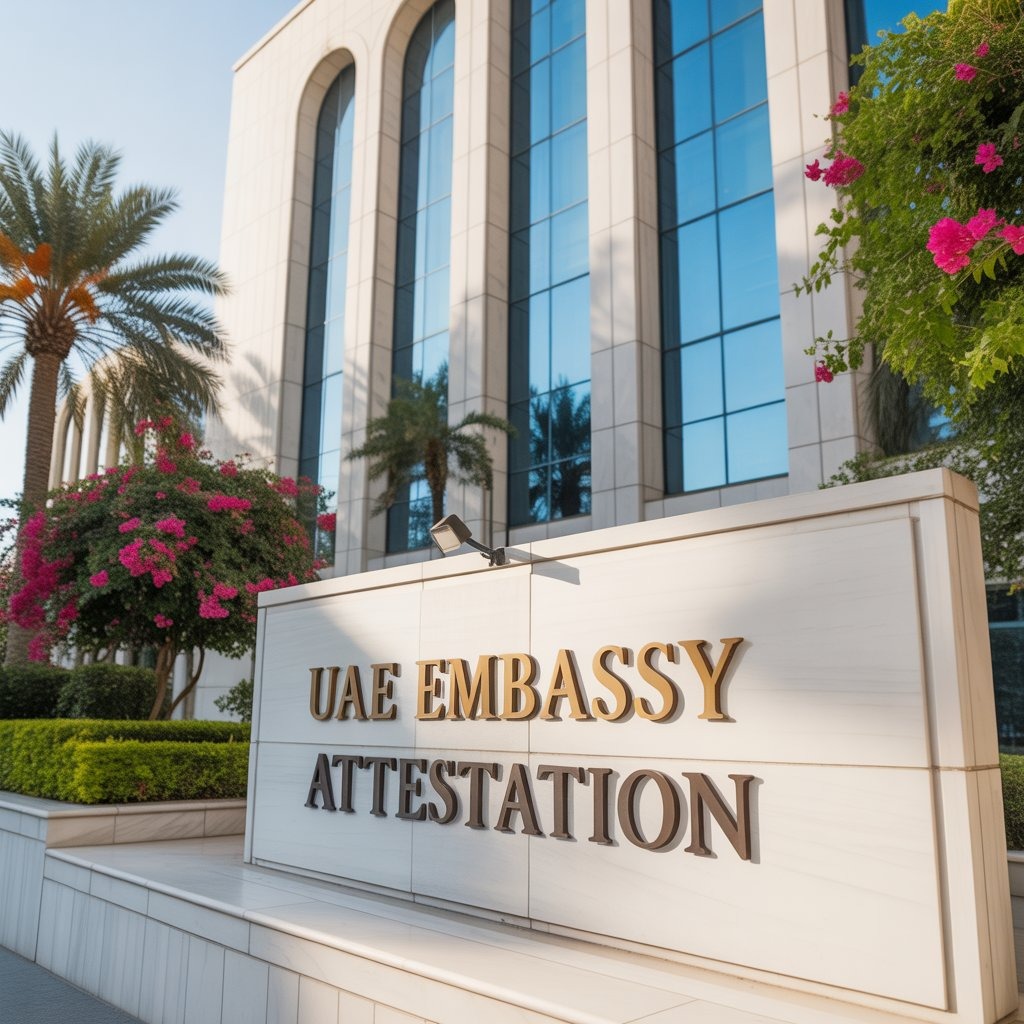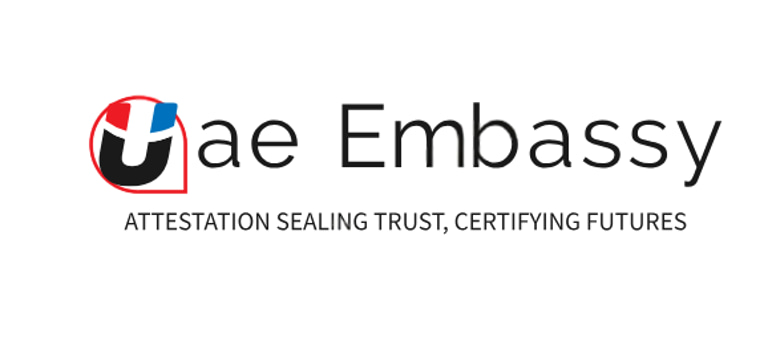Everything You Need to Know About UAE Embassy Attestation
11/20/20257 min read


Introduction to UAE Embassy Attestation
UAE Embassy Attestation is a critical process involving the verification of documents for individuals and entities planning to engage in activities necessitating official recognition in the United Arab Emirates. This procedure is integral in ensuring that documents such as educational certificates, marriage licenses, business contracts, and other legal papers hold validity in the eyes of Emirati law and institutions. The primary purpose of UAE Embassy Attestation is to authenticate these documents and affirm their legitimacy for use in various legal contexts.
The significance of document attestation cannot be overstated, particularly in a country like the UAE, where legal frameworks require stringent compliance with documentation protocols. For individuals, attestation is often required for employment purposes, residency applications, or educational pursuits. Similarly, businesses may require attested documents when establishing operations, securing licenses, or entering partnerships within the UAE. This authentication process not only validates the documents but also bolsters confidence among parties involved in legal transactions.
Failing to obtain the appropriate UAE Embassy Attestation may result in significant repercussions. Unattested documents are likely to be rendered invalid, causing delays or even denials in essential processes, such as obtaining a visa or establishing a business presence. Additionally, parties relying on such documents might find themselves in complicated legal situations, leading to potential disputes or financial losses. Thus, understanding the requirements and ensuring proper attestation is crucial for anyone wishing to navigate the legal landscape of the UAE effectively.
Types of Documents Subject to Attestation
When dealing with the UAE embassy, several types of documents require attestation to validate their authenticity. One of the primary categories includes educational certificates, which range from high school diplomas to university degrees. These documents are crucial for individuals seeking employment or higher studies in the UAE. To facilitate the attestation process, applicants need to provide their original certificates along with a set of necessary identifications, such as a valid passport and sometimes even a confirmation letter from the educational institution.
Another essential category of documents for attestation consists of marriage and birth certificates. Typically, these documents may be required for family-related purposes such as visa applications or residency permits in the UAE. For attestation, it is imperative that these certificates are issued by recognized authorities. Couples may also need to submit additional documentation, such as divorce decrees or death certificates, depending on their individual circumstances.
Furthermore, business documents are also subject to UAE embassy attestation. These include trade licenses, partnership agreements, and incorporation documents. Businesses planning to set up operations in the UAE or seeking partnerships with UAE-based entities must ensure these documents are properly attested. Requirements often differ based on the type of business entity, and it is advisable to consult the embassy guidelines for a comprehensive understanding of what is needed.
Finally, legal agreements such as contracts or memorandums of understanding may also require UAE embassy attestation, particularly for international collaborations. The process ensures that all parties involved adhere to the legal standards established in the UAE. As national differences can affect the requirements, it is essential for individuals and businesses to verify the specific attestation processes pertinent to their nationality or legal circumstances.
The Attestation Process Explained
Obtaining UAE Embassy Attestation is an important procedure that ensures the authenticity of documents intended for use in the United Arab Emirates. The attestation process includes several key steps, each designed to verify the documents' legitimacy. Initially, it is crucial to prepare the necessary documents. This preparation often begins with the verification by the respective home country authorities. Depending on the nature of the documents, this might involve educational certificates, marriage licenses, or business contracts that need to be verified for authenticity before submission for attestation.
Once the documents have been verified, the next step is local notarization. Notarization involves having a licensed notary public authenticate the documents, affirming their legitimacy. This step is essential, as the notarized documents are prerequisites for further processing at the UAE embassy. It is important to ensure that all documents are correctly notarized since any discrepancies can lead to delays in the attestation process.
After confirmation and notarization, the application process at the UAE embassy can commence. Applicants will be required to submit the notarized documents along with a completed application form, which typically includes information about the applicant and the purpose of the attestation. Fees for the attestation service may vary based on the type of document and the region, so it is advisable to consult the embassy’s official website or contact them directly for accurate and updated fee structures.
The timeline for the attestation process can vary, commonly ranging from a few days to several weeks, depending on the complexity and nature of the documents. Furthermore, individuals should be aware of any additional requirements or documents that may differ by region, as these can influence the overall processing time and success of obtaining attestation.
Common Challenges and Solutions
The process of UAE embassy attestation can present a variety of challenges that may complicate or delay the attainment of necessary legal approvals. One frequent issue individuals encounter is document discrepancies. This often occurs when the names, dates, or other critical information on documents do not align across various records, leading to confusion and potential rejections by the embassy. To mitigate this issue, it is advisable to conduct a meticulous review of all documents before submission. Ensuring consistency across various documents can save time and reduce the risk of delays.
Another common challenge is incomplete paperwork. Individuals may underestimate the documentation required for the attestation process, which can lead to submissions that lack sufficient supporting documents. To address this, a thorough checklist should be created, detailing every required document along with their respective certification or notarization prerequisites. Consulting with professionals or utilizing attestation services can also help ensure that no crucial paperwork is overlooked.
Handling foreign documents, especially those from non-English speaking countries, can pose another significant challenge. These documents may require translation and legal verification before they can be presented for UAE embassy attestation. Engaging a reliable translation service, one that specializes in legal documents, is essential. Furthermore, individuals should ensure that translators are certified, as the embassy may not accept documents translated by unrecognized sources.
Legal advice can also play an instrumental role in overcoming these challenges. Many individuals find it beneficial to seek guidance from legal professionals with experience in UAE regulations and embassy procedures. Additionally, engaging a professional attestation service can streamline the entire process, reduce errors, and expedite approvals. By addressing these common challenges proactively, individuals can navigate the UAE embassy attestation process more effectively.
Legal Implications of Non-Attestation
In the context of international law and diplomatic relations, the attestation of documents serves as a critical safeguard, especially for individuals and entities seeking to operate within the United Arab Emirates (UAE). Failing to secure the necessary attestation for documents can have significant legal ramifications. This issue is particularly pertinent for expatriates seeking employment, businesses looking to establish operations, and individuals navigating residency issues.
One of the primary consequences of non-attestation is the potential rejection of documents by government authorities in the UAE. For instance, if a foreign professional applies for a job in the UAE without having their academic and professional credentials duly attested, the employment application may be rejected outright. Employers in the UAE typically require verified documentation to ensure compliance with local regulations, thereby safeguarding their interests and ensuring the integrity of the workforce.
Similarly, businesses looking to operate within the UAE face severe limitations if their legal documents are not properly attested. This lack of recognition can impede the establishment of businesses, obtaining necessary licenses, and participating in contracts. Without proper attestation, contracts may be rendered null and void, exposing businesses to potential legal disputes and financial losses.
In cases dealing with residency, non-attestation can aggravate the situation further. When individuals apply for residency visas, they must present a variety of personal documents, such as marriage certificates or educational degrees. If these documents are not attested, the applications can be delayed or rejected, leaving the individuals in a precarious situation regarding their legal status in the UAE.
Thus, securing the proper attestation is not merely a bureaucratic formality, but a vital step to ensure that legal documents are recognized and acceptable. Neglecting this essential process can ultimately lead to complications that affect employment opportunities, business operations, and residency applications.
Costs Involved in UAE Embassy Attestation
The process of UAE embassy attestation involves several costs that applicants must consider to effectively budget for the entire procedure. To begin with, government fees are a significant portion of the expenses associated with attestation. These fees can vary based on the type of documents being attested and the specific requirements of the UAE embassy in the respective country. Generally, individuals should expect to pay a set fee for each document requiring attestation; thus, the more documents involved, the higher the total cost.
In addition to government fees, there may be charges from notaries or legal firms that assist with the attestation process. Notary services are often necessary to verify the authenticity of documents before they can be submitted for attestation. The costs for notary services can vary widely depending on the complexity of the documents and the rates charged by individual notaries or law firms. Consequently, it is advisable to inquire about the precise costs before proceeding with any notary services.
Furthermore, if the documents are not originally in Arabic or English, translation services may also be required. Professional translation of documents can incur additional costs, which should be factored into the overall financial plan. The prices for translation services depend on the document type, the length of the document, and the service provider's expertise. Given these various factors, potential applicants are encouraged to conduct comprehensive research and possibly obtain multiple quotes from service providers in their area. This thorough cost analysis will ensure that individuals are financially prepared for the UAE embassy attestation process and can avoid unexpected expenses along the way.
Additional Resources and Support
When navigating the complex process of UAE embassy attestation, having access to credible resources can significantly streamline the experience. Several official UAE government websites provide comprehensive information on the required documentation, processes, and guidelines for attestation. The Ministry of Foreign Affairs and International Cooperation (MOFAIC) offers detailed insights into the necessary steps for both individuals and organizations seeking to have their documents attested. Their website is a valuable starting point for anyone needing to understand the legalities involved in this process.
In addition to government resources, frequently asked questions (FAQ) sections can be found on various online platforms related to UAE embassy services. These FAQ sections address common concerns and queries about embassy attestation, such as processing times, fees, and the types of documents that require attestation. Utilizing these resources can aid in clarifying doubts and ensuring that applicants are well-prepared for the process ahead.
For those who prefer personal assistance, numerous professional attestation service providers specialize in facilitating UAE embassy attestation. These companies often offer packages tailored to different needs, completing all required paperwork swiftly and efficiently. Conducting thorough research and reading reviews can help individuals choose a service provider that best aligns with their requirements.
Furthermore, knowing key contacts is essential for anyone facing urgent inquiries or needing immediate legal assistance with their attestation needs. The UAE embassy often has designated contact points or helplines for addressing urgent matters, ensuring direct communication with professionals knowledgeable about embassy policies. Keeping these resources and contacts on hand can provide peace of mind, allowing applicants to focus on other important aspects of their documentation process.
